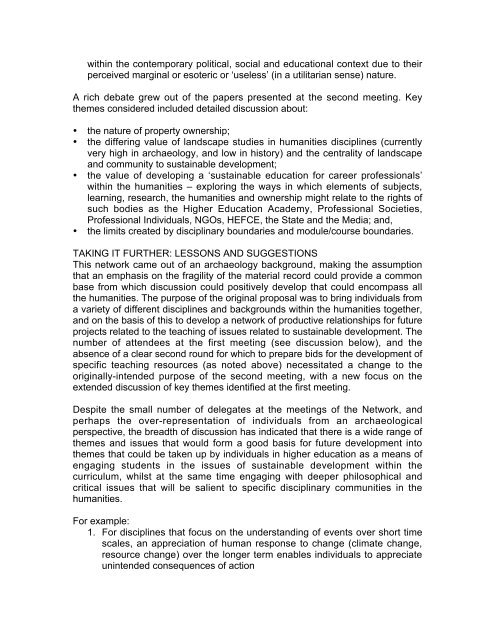Project Briefing A Higher Education Academy ESD Resource
Project Briefing A Higher Education Academy ESD Resource
Project Briefing A Higher Education Academy ESD Resource
You also want an ePaper? Increase the reach of your titles
YUMPU automatically turns print PDFs into web optimized ePapers that Google loves.
within the contemporary political, social and educational context due to their<br />
perceived marginal or esoteric or ‘useless’ (in a utilitarian sense) nature.<br />
A rich debate grew out of the papers presented at the second meeting. Key<br />
themes considered included detailed discussion about:<br />
• the nature of property ownership;<br />
• the differing value of landscape studies in humanities disciplines (currently<br />
very high in archaeology, and low in history) and the centrality of landscape<br />
and community to sustainable development;<br />
• the value of developing a ‘sustainable education for career professionals’<br />
within the humanities – exploring the ways in which elements of subjects,<br />
learning, research, the humanities and ownership might relate to the rights of<br />
such bodies as the <strong>Higher</strong> <strong>Education</strong> <strong>Academy</strong>, Professional Societies,<br />
Professional Individuals, NGOs, HEFCE, the State and the Media; and,<br />
• the limits created by disciplinary boundaries and module/course boundaries.<br />
TAKING IT FURTHER: LESSONS AND SUGGESTIONS<br />
This network came out of an archaeology background, making the assumption<br />
that an emphasis on the fragility of the material record could provide a common<br />
base from which discussion could positively develop that could encompass all<br />
the humanities. The purpose of the original proposal was to bring individuals from<br />
a variety of different disciplines and backgrounds within the humanities together,<br />
and on the basis of this to develop a network of productive relationships for future<br />
projects related to the teaching of issues related to sustainable development. The<br />
number of attendees at the first meeting (see discussion below), and the<br />
absence of a clear second round for which to prepare bids for the development of<br />
specific teaching resources (as noted above) necessitated a change to the<br />
originally-intended purpose of the second meeting, with a new focus on the<br />
extended discussion of key themes identified at the first meeting.<br />
Despite the small number of delegates at the meetings of the Network, and<br />
perhaps the over-representation of individuals from an archaeological<br />
perspective, the breadth of discussion has indicated that there is a wide range of<br />
themes and issues that would form a good basis for future development into<br />
themes that could be taken up by individuals in higher education as a means of<br />
engaging students in the issues of sustainable development within the<br />
curriculum, whilst at the same time engaging with deeper philosophical and<br />
critical issues that will be salient to specific disciplinary communities in the<br />
humanities.<br />
For example:<br />
1. For disciplines that focus on the understanding of events over short time<br />
scales, an appreciation of human response to change (climate change,<br />
resource change) over the longer term enables individuals to appreciate<br />
unintended consequences of action
















